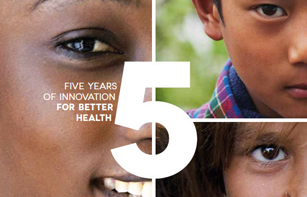
In Five years of innovation for better health, UNITAID highlights a series of successes that have led to cheaper, better medicines in developing countries
Through spearheading innovative initiatives and providing financing for global health over the past five years, UNITAID has had a dramatic impact on millions of lives, using creative market approaches to increase access to treatment and diagnostics for HIV, malaria and tuberculosis.
In its latest progress report, Five years of innovation for better health, UNITAID, which was established in 2006, highlights a series of successes that have led to more focused and effective interventions. This is seen as especially critical in the current economic climate where health funding shortfalls have become increasingly apparent.
According to Denis Broun, UNITAID Executive Director, the organisation, “has become a key player in the Global Health architecture and a driver of the global agenda on access to medicines for the poor.”
Children living with HIV have benefited greatly from UNITAID’s approach, which has created a new market for child-friendly HIV medicines, including single pill formulations. In 2006 the organization began investing in paediatric HIV drugs and diagnostic tests in Africa, Asia and the Caribbean.
In the past, the few existing antiretrovirals for children had been expensive, hard to store and required up to 18 unpleasant-tasting doses a day. Along with the Clinton Health Access Initiative, UNITAID used ‘pooled procurement’ across 40 countries to generate sufficient demand to help bring down costs. Price reductions of up to 80% have been achieved and some 400,000 children living with HIV are now being treated under this scheme—three quarters of the world’s total.
Dr Mwiya Mwiya, from Zambia’s University Teaching Hospital Paediatric Centre of Excellence, has noticed a marked difference, “In 2005 we felt hopeless as physicians because many kids died. In 2011, it was clear how far we advanced, with proper formulations and tests for children. Now we know we can make a difference.”
Many adults living with HIV have also seen their lives improve. UNITAID has secured price reductions of up to 60% for key second-line antiretrovirals so that more than 100,000 people a year for whom the first-line drugs have failed can shift to more powerful HIV treatment. Before 2006 such drugs were too expensive in low-income countries.
In the first five years of its existence, UNITAID has become a key player in the Global Health architecture and a driver of the global agenda on access to medicines for the poor
Denis Broun, Executive Director, UNITAID
Access to life-saving drugs has also been made easier by UNITAID’s creation of the Medicines Patent Pool in 2010. By encouraging patent holders to licence their intellectual property, generic manufacturers can produce low cost, high quality versions of drugs. It acts as a ‘one-stop shop’ for both the licenses needed and product development partnerships to make the medicines. In July 2011 the Patent Pool signed a landmark agreement with Gilead Sciences, a biopharmaceutical company, for five HIV drugs covering more than 100 countries.
Additionally, UNITAID’s interventions have led to more than eight million pregnant women being tested for HIV and 800,000 of those found to be HIV-positive being treated to stop the transmission of HIV infection to their children. UNITAID has funded advanced laboratory facilities to detect multi-drug-resistant TB in eight high burden countries. It is also the largest funder of the Affordable Medicines Facility – malaria (AMFm), which aims to put the most effective malaria treatments available today into the hands of the people who need them the most.
One of the key sources for funding, which accounts for around 65% of UNITAID’s revenue, has been the introduction of a small levy on air tickets. This can range from US$1 to US$40 and is added to an existing airport tax with some or all of the funds going to UNITAID. So far, US$1.3 billion has been raised through this initiative which has been implemented by nine countries: Cameroon, Chile, Congo, France, Madagascar, Mali, Mauritius, Niger and the Republic of Korea.
UNITAID is also exploring new ways of raising resources. One possibility for the future is a Financial Transaction Tax on stocks, bonds and derivatives which the organisation says could raise billions of dollars a year.
According to the report, the ripple effect of UNITAID’s core achievements, such as price reductions and the introduction of new medicines, is being felt throughout the developing world as markets are transformed to make them work for the poor.




